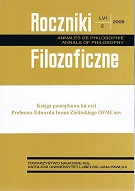Chronologia, struktura i analiza kwestii Jan Dunsa Szkota o jednostkowieniu z "Quaestiones super libros Metaphysicorum Aristotelis" VII, qu. 13
The Chronology, Structure and Analysis of John Duns Scotus’s Question On Individuation from the Quaestiones super libros Metaphysicorum Aristotelis VI
Author(s): Grzegorz Witold SalamonSubject(s): Philosophy
Published by: Towarzystwo Naukowe KUL & Katolicki Uniwersytet Lubelski Jana Pawła II
Keywords: Duns Scotus; the problem of individuation; the principle of individuation; theories of individuation; the Scotistic Commission; Duns Szkot; problem jednostkowienia; zasada jednostkowienia; teorie jednostkowienia; Komisja Szkotystyczna
Summary/Abstract: The paper is devoted to the question of the principle of individuation in Bl. John Duns Scotus. This question is found in his commentary to Aristotle’s Metaphysics, namely the Quaestiones super libros Metaphysicorum Aristotelis VII, qu. 13. The first part of the paper discusses problems connected with the chronology and structure of the text, whereas the second one is presented as Scotus’s teaching on individuation. S. Dumont and T. Noone argue today on the traditional thesis about the origin of this question and the remaining philosophical writings from the juvenile stage of Scotus’s philosophical work. They claim that some questions from the In Metaph., including also qu. 13 from the book, were written later or in the same time as the commentaries to Peter Lombard’s Sentences. The authors support their views by indicating the following: 1) the text the In Metaph. is better organised, 2) the vocabulary used with reference to the principle of individuation, especially the term haecceitas, is employed twice in the text In Metaph., 3) the quotations from the later works of Scotus and the works of authors who wrote somewhat later than that date of the In Metaph. hitherto presumed, 4) some stylistic terms indicate that the author of the text was a mature person. The traditional thesis is defended by L. Modrić on behalf of the Scotistic Commission. Having made a detailed analysis, Modrić rejected all the arguments from the introduction to the critical edition of the In Metaph. The author of this paper agrees with Modrić’s view. Therefore as long as we do not have a thesis to the contrary we shall hold the traditional opinion about the earlier origin of the In Metaph. in comparison to Peter Lombard’s commentaries on the Sentences. Scotus opens his lecture on individuation with a discussion of various standpoints on this issue. He divides them into positive and negative theories of individuation. This ordering ensures a clear exposition of various views without unnecessary repetitions and vagueness. Eventually, Doctor Subtilis rejects all hitherto views and provides his own solution. The principle of individuation is for him an individuating entity, the ultimate reality of the individual being. In combination with common nature it determines the most individual of possible characterisation of the individuum. This positive individuating entity is called an individual form (forma individualis) in the In Metaph., a degree of entity (gradus entis) and haecceitas. The latter became a technical term to define the Scotist principle of individuation.
Journal: Roczniki Filozoficzne
- Issue Year: 56/2008
- Issue No: 2
- Page Range: 255-271
- Page Count: 17
- Language: Polish

